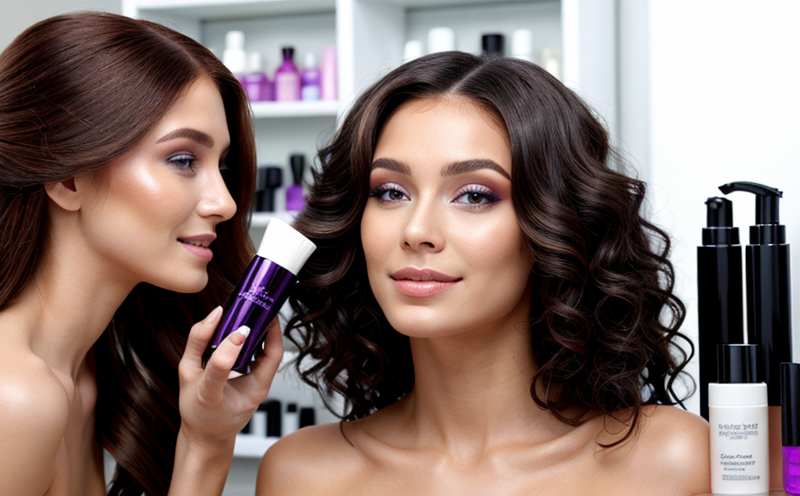Viscosity Testing of Hair Creams and Lotions
The viscosity of hair creams and lotions plays a crucial role in determining their application properties and overall efficacy. Viscosity is the measure of a fluid’s resistance to flow, which significantly impacts how the product spreads on the scalp or hair strands during use. This test ensures that the product meets both consumer expectations and regulatory standards.
For instance, a lower viscosity may indicate ease of application but could also suggest a less robust formula, while higher viscosity might enhance the product's hold but could be perceived as too thick by users. Understanding these nuances is essential for quality managers and R&D engineers to balance consumer satisfaction with market competitiveness.
The testing process involves several key steps: specimen preparation, sample conditioning, measurement using appropriate viscometers, and interpretation of results within the context of industry standards such as ISO 3215. The choice of viscometer (such as capillary tubes or rotational viscometers) depends on the viscosity range expected for the hair creams and lotions.
Specimen preparation is critical; it involves ensuring that samples are representative of the batch being tested. This might include mixing ingredients thoroughly before drawing a sample, allowing the product to reach equilibrium temperature if necessary, or both. Sample conditioning ensures that the material properties are stable and consistent with how they will be used in real-world applications.
The measurement process itself requires precision and attention to detail. Rotational viscometers provide accurate readings by rotating at various speeds and measuring shear stress over a range of shear rates. Capillary tubes measure flow time under controlled conditions, which is particularly useful for determining thixotropic behavior in hair care products.
Interpreting the results involves comparing them against established criteria from standards like ISO 3215 or ASTM D5606. These standards define acceptable ranges of viscosity based on product type and intended use. Compliance with these guidelines ensures that the product performs as expected in terms of application ease and overall performance.
Understanding the implications of viscosity testing extends beyond just ensuring compliance; it helps manufacturers optimize formulas for better user experience. By carefully tuning viscosities, companies can achieve optimal spreading properties without compromising on product integrity or shelf life stability.
This level of expertise is not only beneficial for maintaining market standards but also contributes positively to the broader industry by promoting transparency and reliability in cosmetic formulations.
Benefits
Viscosity testing offers numerous benefits that are vital for ensuring high-quality hair care products. One significant advantage is improved product performance, as it helps maintain consistent spreading properties across different batches of the same formulation. This consistency translates directly into better customer satisfaction and brand loyalty.
Another key benefit lies in enhanced regulatory compliance. By adhering to strict standards like ISO 3215 or ASTM D5606 during viscosity testing, manufacturers ensure their products meet international quality benchmarks. This not only simplifies export processes but also builds trust among consumers regarding product safety and efficacy.
For research & development teams, this type of testing provides valuable insights into formula optimization. Knowing exactly how changes in ingredients or manufacturing methods affect the viscosity allows for more informed decision-making throughout the product lifecycle. This leads to innovations that can significantly differentiate products within competitive markets.
In terms of procurement strategies, understanding the importance of viscosity helps sourcing departments select suppliers who adhere closely to these standards. It ensures that raw materials consistently contribute positively towards achieving desired end-product characteristics.
Moreover, efficient viscosity testing reduces waste and costs associated with rework or scrapping substandard batches early in production cycles. This efficiency contributes to sustainable practices by optimizing resource utilization throughout the supply chain.
Eurolab Advantages
At Eurolab, we pride ourselves on offering advanced services that cater specifically to your needs in hair care product development and quality assurance. Our state-of-the-art laboratory facilities equipped with cutting-edge technology ensure accurate measurements under controlled conditions.
We employ highly trained technicians who understand the intricacies of viscosity testing within cosmetics. Their expertise allows us to provide precise results tailored to each client’s requirements, whether you are a small startup or an established multinational corporation.
Our commitment extends beyond just conducting tests; we also offer comprehensive consulting services aimed at helping clients interpret data correctly and implement necessary adjustments effectively. Whether it's refining existing formulas or creating new ones from scratch, our team works closely with you every step of the way.
In addition to technical excellence, Eurolab values sustainability in all aspects of its operations. By choosing us as your partner for viscosity testing, you contribute positively towards reducing environmental impact through efficient resource management and waste minimization practices throughout the cosmetic industry supply chain.
Environmental and Sustainability Contributions
EuroLab's approach to viscosity testing in hair care product development aligns closely with global sustainability goals. By emphasizing precision and repeatability, we minimize waste associated with repeated trials or adjustments needed due to inaccurate measurements.
The use of advanced equipment ensures that samples are used optimally, reducing the amount of raw materials discarded during preparation stages. Furthermore, our adherence to stringent quality control measures helps prevent substandard products from reaching consumers prematurely, thus avoiding unnecessary returns and replacements which could lead to additional resource consumption down the line.
Through these efforts, EuroLab actively contributes towards creating a more sustainable future for the cosmetic industry by promoting efficient use of resources and fostering innovation that aligns with environmental considerations. Our commitment reflects broader trends in corporate social responsibility within this sector as companies increasingly recognize their role in shaping positive change.





